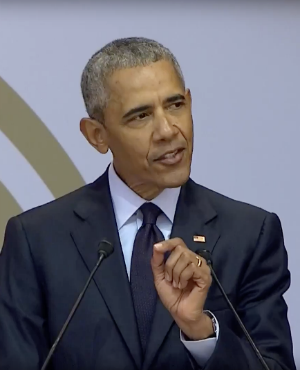
The celebration of Nelson Mandela's 100th birthday last week and former US president Barack Obama's address at the occasion brought warmth to my heart, but also caused me to ask with Obama: Were we who believed in a progressive vision of tolerance, a common humanity, a caring, open society and social justice naïve? Is this vision dead?
"Progressive" is the key word here. Many associate it with left-wing political thinking, others with liberalism, yet others claim the title but are anything but progressive.
To me a progressive political ethos simply means a desire and agitation for continuous progress towards a better and more caring society with the emphasis on openness, social justice, human dignity and solidarity rather than populism or identity politics.
These values were not a mirage in Mandela's world.
Five days after his release in February 1990 he invited me for tea at his humble Soweto house. He was a world famous 68-year-old Xhosa speaking man, a revolutionary who had just been released from prison after 27 years; I was a middle class white Afrikaner more than 40 years younger.
Mandela spoke to me in Afrikaans after apologising for what he called his Xhosa accent. It was just him and me and he made and poured the tea – far too much milk and sugar to my taste, but I would have drunk a cup of bile with a smile that day just to be in his presence.
He gave me a lesson in Afrikaner history and said he not only needed Afrikaners to buy into his vision of a new society, but he thought they would make good allies and eventually feel at home and be active in a new, inclusive nation. If only they could remember their own struggles with British imperialism and overcoming poverty, he added.
But more importantly, Mandela shared some of his ideas of a more loving, compassionate society where all citizens, especially young people, would have the possibility to live to their full potential.
I remember finding it astonishing that this human being who was so fresh out of an apartheid prison could talk to me about love and compassion. He wasn't an ideologue, he was a progressive humanitarian.
In the years after this meeting, Mandela practiced and preached these ideas and ideals; and in the process inspired many millions of people all over the world, including a young American lawyer who would become the president of his country in 2009.
But over the last decade or so, South Africa has regressed into an erosion of our democracy, cheap populist politics, a culture of entitlement, selfishness and corruption, ethnic nationalism, polarisation and intolerance.
It wasn't much different in other parts of the world. Obama speaks of the "politics of fear and resentment and retrenchment", of growing authoritarianism, the undermining of free speech, the contempt for truth and facts and of strongman politics.
In South Africa the narrative of black emancipation was abused to cover up the abuse of power, maladministration and corruption and to mobilise people around narrow ethnic chauvinisms.
On the side of the white minority there were far too many who chose to remember Mandela's forgiveness and reconciliation but to forget his insistence on social justice and redress. They started withdrawing with the self-pity of a newly discovered victimhood into their privileged ethnic trenches from where they are firing shots at the rest of society.
The world's most prosperous and successful societies, says Obama, the ones with the highest living standards and highest levels of satisfaction among their people, happen to be "those who have most closely approximated the liberal, progressive ideal that we talk about and have nurtured the talents and contributions of all their citizens".
He adds: "The fact is that countries which rely on rabid nationalism and xenophobia and doctrines of tribal, racial or religious superiority as their main organising principle, the thing that holds people together – eventually these countries find themselves consumed by civil war or external war."
I agree with Obama that the road back to progressive values would be a tough and possibly long one, but one that has to be tackled with courage and perseverance.
We have to fight harder to reduce inequality, says Obama, and do a lot more to promote lasting economic opportunity for all.
He favours an "inclusive market-based" system but warns against "unregulated, unbridled, unethical capitalism". I agree.
Obama quotes from Mandela's teachings that the most important universal principle is that we are bound together by a common humanity and that each individual has inherent dignity and worth.
Embracing our common humanity does not mean that we have to abandon our unique ethnic and national and religious identity – Mandela himself never stopped being a black African South African of Xhosa heritage.
I think Obama would have understood what we meant when we embraced the principle of non-racialism in the 1980s.
I hope we South Africans will use this year of remembering Nelson Mandela to ponder how we could see beyond the thunder and lightning and imagine a better future for our society.
I can recommend reading matter for this purpose: the Founding Principles and Bill of Rights of the South African Constitution.
Disclaimer: News24 encourages freedom of speech and the expression of diverse views. The views of columnists published on News24 are therefore their own and do not necessarily represent the views of News24.




 Publications
Publications
 Partners
Partners























